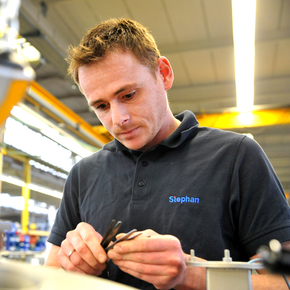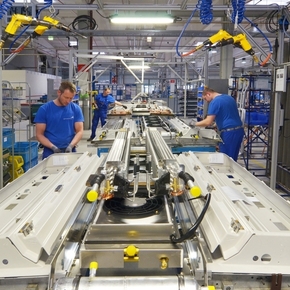Strong growth generated by new customer segment
The topic of digitization and, above all, the necessary nationwide expansion of a broadband network for high data transmission rates is a recurring topic of discussion in politics and the media. One company that has been actively addressing this issue for more than ten years is inexio. The company is investing in several German states in the development of an efficient telecommunications infrastructure, thereby helping to make Germany fit for the future as a business location.
Background
inexio, based in Saarlouis, Saarland, was founded in 2007 with the aim of expanding broadband for fast and secure internet connections. The management recognized early on the trend of rapidly increasing data volumes due to constantly improved technologies and new applications and the associated need for additional high-performance infrastructure for data traffic.
At the beginning of its business activities, the company was mainly active in Saarland and Rhineland-Palatinate. The focus was on corporate customers, for whom fast and stable internet connections are vital. For inexio, corporate customers offered the advantage of long-term contracts that promise predictable income and allow higher margins. The high level of investment required for the expansion of the fibre-optic network was a decisive factor in the focus on selected regions and business customers.
The company's entry into the residential customer business came more by chance. When the mayor approved the construction of a route through a rural village, he requested that inexio also connect the private households of the community to the broadband network. The profitability calculation showed that this was worthwhile. The business model was thus decisively changed: The considerable growth potential of the residential customer business quickly became apparent. However, in order to leverage this potential, considerable further investment was initially required: Many individual households in rural areas require a more widely ramified data network than a comparatively manageable number of commercial areas. When it comes to underground installation, every metre of excavation counts. Investments for which the necessary capital was not available at the time.
Achievements during DBAG’s investment
2013
27000
Customers
2019
110000
Customers
Number of residential customers almost quintupled.
Revenues & earnings
>20
per cent
Revenues and earnings grew by well over 20 per cent annually.
Number of Employees
3x
The number of employees has more than tripled to 400.
Challenges
The biggest challenge for inexio was therefore to finance the high investments for the laying of the connections. The company had already pursued various options to cover its capital requirements. Bank financing was difficult to obtain - partly because no collateral on the buried pipes could be entered in the land register. Finally, private equity companies were approached. On the basis of higher equity capital, further bank financing should enable rapid expansion of the business. The aim was to develop not only the federal states of Saarland and Rhineland-Palatinate but also Bavaria, Baden-Württemberg and parts of Hesse, with the ultimate aim of achieving a market-leading position in rural and small-town regions of Germany.
DBAG was able to prevail over other private equity companies. This was helped not least by the fact that it was as familiar with the market served by inexio and its developments as it was with the needs of medium-sized companies. For DBAG it was a fairly simple investment decision: The business model promised high growth potential, due to the increasing data volumes in the future, which required fast connections for companies and private households. In addition, it guaranteed stable and predictable cash flows due to the monthly customer payments. In addition, inexio had an entrepreneurial, highly motivated management team with considerable experience and know-how in the rollout of fibre-optic lines and the operation of telecommunications infrastructure.
inexio and the managing partners described the negotiations with DBAG as very straightforward. They emphasized DBAG's previous knowledge as well as its flexibility in terms of financing instruments, the short due diligence and the lean investment contract of only eleven pages. An agreement was reached after only four months: In May 2013, DBAG and DBAG ECF took a minority stake in the company in the course of a capital increase and provided additional capital with profit participation rights.
Measures
Deutsche Beteiligungs AG quickly supported the growth of inexio. Based on an investment request from the industry, RiesDSL, a local broadband provider from Bavaria, was referred to inexio for acquisition. Thanks to good capital resources, inexio was able to acquire additional smaller local providers in the following years, thus ensuring further inorganic growth: p2 systems was acquired in 2014, Smart DSL in 2015 and Komnexx in 2016. The local providers of broadband connections were very attractive - they contributed to growth and enabled market entry into new regions.
In addition to its contacts in the industry, inexio also benefited from its connections to various banks. DBAG's investment enabled inexio to put the financing of its expansion on a stronger footing - with new long-term loans, which were essential for success in the private household business. In 2016, financial investor Warburg Pincus secured a majority stake in the broadband provider inexio through a further, extensive capital increase and share purchases from existing shareholders. This gave the company another significant boost in the implementation of its growth plans.
Exit
During the time of the investment, inexio has gradually built up a comprehensive fibre-optic network in rural and suburban regions of southern Germany and implemented the corporate concept both through organic growth and acquisitions. The success can be documented in figures: Five times more customers than at the beginning of the investment. Sales and earnings were increased by well over 20 percent annually. The number of employees has more than tripled to around 400. While the company has so far pushed ahead with the fibre-optic expansion into the towns and cities and the last kilometre into the households was realized using Deutsche Telekom's copper cables, fibre-optic connections are now being laid directly into the buildings. However, this further infrastructure expansion requires around three times the investment volume and therefore additional equity. The new development phase in the company's history is being implemented by inexio together with the infrastructure fund EQT Infrastructure IV, which acquired inexio at the end of 2019.


 Newsletter
Newsletter





 Contact
Contact
 Downloads
Downloads






